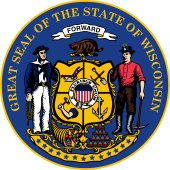| 1889 Wisconsin Act 519 | |
|---|---|
 | |
| 39th Wisconsin Legislature | |
| |
| Citation | 1889 Wisc. Act 519 |
| Enacted by | 39th Wisconsin Legislature |
| Enacted | April 18, 1889 |
| Signed by | William D. Hoard |
| Introduced by | Michael John Bennett |
| Repealed by | |
| 1891 Wisc. Act 4 | |
| Status: Repealed | |
The Bennett Law, officially 1889 Wisconsin Act 519, was a controversial state law passed by the Wisconsin Legislature in 1889 dealing with compulsory education. The controversial section of the law was a requirement to utilize the English language as the sole medium of instruction in all schools, whether private or public. Meanwhile, German Catholics and Lutherans, who combined a strong sense of American patriotism with strong ethnic pride, operated large numbers of parochial schools in the state and widely utilized the German language in the United States as the medium of instruction. The Bennett Law was bitterly resented by German Americans, but also by Catholic Polish Americans, and even by Scandinavian immigrant communities. The law was seen not only as an insult to the patriotism of the State's large community of non-English-speaking voters, but also as an unconstitutional attack against the independence of their church denominations and religious schools from control by the State. Although the law was ultimately repealed, there were significant political repercussions in the 1890 and 1892 elections; for the first time in decades Democrats won control of the Legislature and all state-wide elected offices, as well as both U.S. Senate seats and nearly all of Wisconsin's seats in the U.S. House of Representatives.